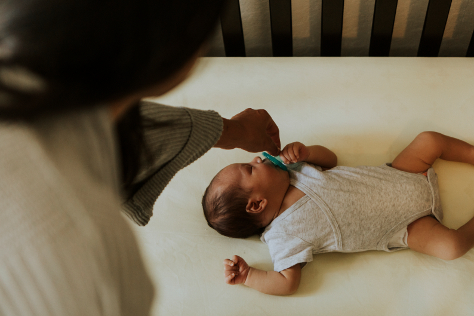The lowdown on dummies and SIDS
Understanding how to use a dummy safely when putting your baby down for a sleep

Some research suggests that using a dummy when putting a baby down to sleep could reduce the risk of SIDS but it is advised to wait until after breastfeeding is established.
Although not extensive research, it shows that it is possible that using a dummy when putting a baby down to sleep could reduce the risk of sudden infant death.
- If you choose to use a dummy, wait until breastfeeding is well established (at up to about 4 weeks old).
-
Stop giving a dummy to your baby to go to sleep between 6 and 12 months.
-
Don’t force your baby to take a dummy or put it back in if your baby spits it out. Don’t use a neck cord.
-
Don’t put anything sweet on the dummy, and don’t offer during awake time.
-
Using an orthodontic dummy is best as it adapts to your baby’s mouth shape.
-
If you choose to use a dummy make sure it is part of your baby’s regular sleep routine.
Dummies and SIDS: FAQs
Why does using a dummy reduce the chance of a baby dying suddenly?
We do not know exactly what it is about a dummy that may help reduce the chance of a baby dying of SIDS. As with most of the safer sleep information, we only know that there is good evidence to show what you can do to reduce the chance of SIDS, and what increases the chance and should be avoided.
Does my baby need to use a dummy every day?
Regular dummy use is the best way to use a dummy. This means offering your baby a dummy each time you put them down for a sleep, day or night. You and your baby will also find it easier to have a regular sleep routine. If the dummy falls out of your baby’s mouth during sleep, there is no need to put it back in.
Will using a dummy make breastfeeding more difficult?
If you choose to use a dummy, only introduce it once you have established breastfeeding. The time this takes differs for each person, but it could be a few weeks. Make sure you get help if you need it. Once breastfeeding is established, introducing a dummy should not have a negative effect.
What do I do if my paediatrician has recommended I use a dummy, but I have not properly established breastfeeding with my baby?
There are some situations in which babies are given dummies by medical professionals when breastfeeding has not been established:
-
As a general comforter for babies, it may be helpful to provide a dummy when they are receiving procedures or when on ventilators.
-
It can also help to develop some facial muscles in premature babies as they learn to suck.
-
For babies receiving a certain kind of ventilation called CPAP, a dummy helps to keep their mouths closed and to maintain pressure in their airways.
We recommend that parents follow health professional advice in these situations.
What if my baby won’t take a dummy?
Not all babies like using dummies. If your baby repeatedly refuses a dummy, do not force them to take it.
Some studies have suggested that finger or thumb-sucking may give a similar benefit, but even if your baby does not do this, following other safer sleep advice such as not smoking and placing your baby to sleep on their back will still significantly lower their chance of SIDS.